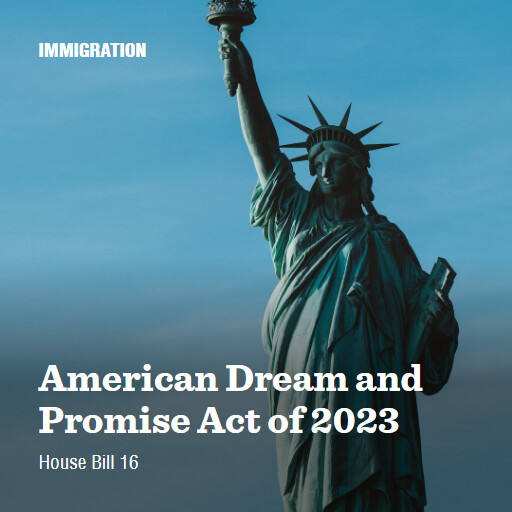
American Dream and Promise Act of 2023
This bill provides certain non-U.S. nationals (aliens under federal law) with a path to receive permanent resident status and contains other immigration-related provisions.
The Department of Homeland Security (DHS) or the Department of Justice (DOJ) shall provide conditional permanent resident status for 10 years to a qualifying individual who entered the United States as a minor and (1) is deportable or inadmissible, (2) has deferred enforced departure (DED) status or temporary protected status (TPS), or (3) is the child of certain classes of nonimmigrants. The bill imposes various qualifying requirements, such as the individual being continuously physically present in the United States since January 1, 2021, passing a background check, and being enrolled in or having completed certain educational programs.
DHS shall remove the conditions placed on permanent resident status granted under this bill if the alien applies and meets certain requirements, such as completing certain programs at an educational institution, serving in the military, or being employed.
Furthermore, DHS and DOJ shall provide lawful permanent resident status to certain individuals who had TPS, were eligible for TPS, or were eligible for DED status on certain dates. Such individuals must meet certain requirements and apply for such status within three years of this bill's enactment.
DHS may not use information from applications filed under this bill or for Deferred Action for Childhood Arrivals status for immigration enforcement purposes.
This bill also repeals a restriction that bars a state from providing higher education benefits to undocumented individuals unless those benefits are available to all U.S. nationals without regard to residency in the state.
The bill establishes permanent resident status on a conditional basis for certain long-term residents who entered the US as children.
The bill provides for the adjustment of status for certain nationals of certain countries designated for temporary protected status or deferred enforced departure.
The bill includes provisions regarding biometric and biographic data submission, background checks, limitations on removal, determination of continuous presence and residence, exemption from numerical limitations, administrative and judicial review availability, documentation requirements, rulemaking, confidentiality of information, grant program to assist eligible applicants, provisions affecting eligibility for adjustment of status, supplementary surcharge for appointed counsel, and annual report on provisional denial authority.
The bill outlines eligibility criteria for the removal of the conditional basis, including education, military service, or earning income over a specified period.
The bill allows for the restoration of state option to determine residency for higher education benefits.




